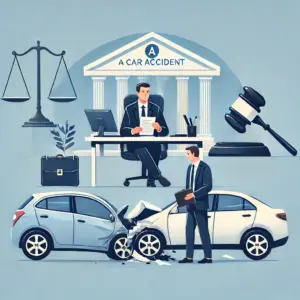 A car accident is traumatic. It shocks you. It dazes you. Knowing what to do makes all the difference. It is safeguarding. It is safeguarding your rights. We will walk you through it in this article. We will walk you through the entire process, whether immediate or long-term.
A car accident is traumatic. It shocks you. It dazes you. Knowing what to do makes all the difference. It is safeguarding. It is safeguarding your rights. We will walk you through it in this article. We will walk you through the entire process, whether immediate or long-term.
Immediate Actions: Putting Safety First
Your first priority is safety. Check yourself for injuries. Check your passengers. Move your vehicle if possible. Get it out of traffic. Turn on your hazard lights. This prevents further accidents. Call 911 if anyone is injured. Call the police even if there are no injuries. A police report is vital.
Gathering Information: Documenting the Scene
Get details from the other driver. Get their name. Get their contact information. Get their insurance. Get their license plate number. Take photos of the scene. Take photos of the damage. Take photos of the other vehicle. Get the time and location. Get the weather. Get witness contact information. Their statement is helpful.
Reporting the Accident: Alerting the Authorities
Call the police. They will make a report. The report documents the accident. The report documents the damage. The report documents the parties. Call your insurance company. Report the accident immediately. Provide them with all of the information that you were provided. Reporting late will make your claim harder.
Seeking Medical Treatment: Taking Care of Injuries
Even if you don’t feel worse, get to the doctor. Some kinds of injury aren’t visible at first. Adrenaline conceals pain. You need a doctor’s appointment. It documents your injuries. It connects them to the crash. Document medical care, Document medical expenses.
Knowing Your Insurance: Navigating the Claims Process
Your policy is a contract. Be familiar with your coverage. Be familiar with your deductibles. Be familiar with your policy limits. Call your insurance adjuster. They will guide you through the claim. They will tell you about your benefits. Do all this in writing. This will leave you with a paper trail.
Legal Considerations: Protecting Your Rights
Hire an attorney who does personal injury law. They can inform you about your rights. They can inform you about your choices. They can negotiate on your behalf. They can negotiate in court. You may be entitled to money if someone was careless and you got injured.
Documenting Your Damages: Gathering Evidence
Document all your spending. This involves your medical billings. This involves the price of repairs. This involves wages lost. Keep a record of any out-of-pocket spending. Keep a record of your injuries. Keep a record of your recovery. Keep a record of any emotional distress. These will support your claim.
How to Handle Insurance Adjusters: Protecting Your Interests
Insurance adjusters are employees of the insurance company. They try to limit payments. Be careful when talking. Never accept responsibility. Never give a recorded statement without an attorney. Never sign anything without reading it. Talk to your car accident lawyer before accepting any settlement.
Long-Term Actions: Recovery and Resolution
Most importantly, your recovery. Recover physically and emotionally. Do what your doctor instructs you to do. Attend all of your therapy appointments. Rest easily while recuperating. Be optimistic. The law is a gradual process. Have patience.
Communicating Effectively: Keeping Records and Being Informed
Be honest with your attorney. Provide them with all the facts in your case. Provide them with your medical records. Provide them with your expenses. Ask if you do not get it. Check on the progress of your case at all times.
Financial Planning: Managing Costs
A car accident can affect your financial status. Prepare yourself. Budget. Monitor your finances. Look into buying disability insurance if necessary. Be prepared for how your medical expenses will be paid for. Think about how lost wages will be covered.
Emotional Support: Coping with the Trauma
A car accident can also cause emotional trauma. Don’t dismiss it. If needed, seek professional help. Go and consult a counsellor. Attend a support group. Take the support of your family and friends. Healing from emotional trauma is as much a necessity as healing from physical injuries.
Guarding Your Future: Learning from the Experience
Read your policy. Consider raising your coverage limits. Drive safely. Pay attention. Do not get distracted. Use seat belts. Maintain your car in good working condition. Plan for emergencies.
Being Informed: Accessing Resources and Legal Information
There are many sources of help. The National Highway Traffic Safety Administration (NHTSA) provides safety tips. Your state’s Department of Motor Vehicles (DMV) has rules of the road. Legal aid societies may be able to help you. Think about hiring a personal injury lawyer. They will provide expert legal counsel.
When to Hire a Lawyer: Understanding When the Case is Not Complex
Call an attorney right away if there are serious injuries. Call an attorney right away if there is a death. Call an attorney right away if there is a disagreement over fault. Call an attorney right away if you are having trouble with an insurance company. Call an attorney right away if you miss time from work.
The Need for Patience: Navigating the Legal System
The law is slow. Be patient. Take your time. Trust your attorney’s work. Focus on healing. Enjoy your small triumphs. Focus on reclaiming your life.
Conclusion
A car accident is traumatic. Information is empowerment. Doing what is right is what insulates you. It insulates your future. It helps to recover. Don’t let fear and uncertainty stand in the way of getting what is yours. Safety is important. Document everything. Get medical care. Consult with a lawyer.



